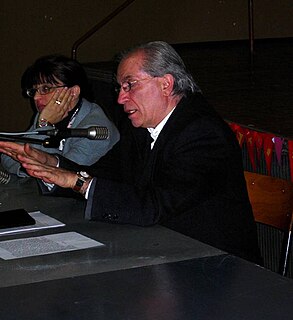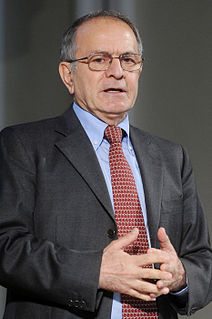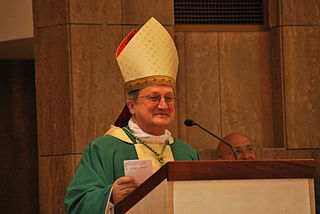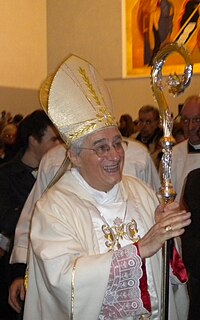Gnosis is the common Greek noun for knowledge. The term is used in various Hellenistic religions and philosophies. It is best known from Gnosticism, where it signifies a knowledge or insight into humanity’s real nature as divine, leading to the deliverance of the divine spark within humanity from the constraints of earthly existence.
Gianni Baget Bozzo was an Italian Catholic priest and politician.

Costanzo Preve was an Italian philosopher and a political theoretician. He is widely considered as one of the most important anti-capitalist European thinkers and a renowned expert in the history of Marxism. His thought is based on the Ancient Greek and idealistic tradition philosophy under the influence of Johann Gottlieb Fichte, Georg Wilhelm Friedrich Hegel and Karl Marx. He is author of many essays and volumes about philosophical interpretation, communitariansm and universalism.
Ernesto Buonaiuti was an Italian historian, philosopher of religion, Catholic priest and anti-fascist. He lost his chair at the University of Rome owing to his opposition to the Fascists. As a scholar in History of Christianity and religious philosophy he was one of the most important exponents of the modernist current.

Ermis Segatti, is a Catholic theologian and university Professor belonging to the Archdiocese of Turin, Italy.

Luciano De Crescenzo is an Italian writer, film actor, director and engineer.

Raimondo Spiazzi OP was an Italian Catholic theologian, advisor to Pius XII, and Mariologist with over 2,500 publications.
Alberto Melloni is an Italian church historian, primarily known for his work on the Second Vatican Council.
This is a list of works published by Umberto Eco.
Roberto de Mattei is an Italian Roman Catholic historian and author.

Emilio Gentile is an Italian historian specializing in the ideology and culture of fascism. Gentile is considered one of Italy's foremost cultural historians of fascist ideology. He studied under Renzo De Felice and wrote a book about him.

Enrico dal Covolo SDB is a Catholic bishop and Italian theologian, Assessor of the Pontifical Committee for Historical Sciences from 15 January 2019. He previously served as the rector of the Pontifical Lateran University from his appointment on 30 June 2010 until 2 June 2018. In addition he was also the postulator of the cause of canonization of Pope John Paul I from 2003 until 2016.
Luca Serianni is an Italian linguist and philologist.

Augusto Del Noce was an Italian philosopher and political thinker.

Gianni Ambrosio is the current bishop of the Roman Catholic Diocese of Piacenza-Bobbio.

Antonio Nicaso is an Italian author, university professor, researcher, speaker and consultant to governments and law-enforcement agencies originally from Calabria, Italy, now based in Toronto, Ontario, Canada. He is an expert on the Calabrian mafia. Nicaso lives and works in North America. He teaches courses on "Social History of Organized Crime in Canada" and "Mafia Culture and the Power of Symbols, Rituals and Myth" at Queen's University, in Kingston, Ontario in Canada. He also teaches at St. Jerome's University in Waterloo, Ontario and the Italian School of Middlebury College in Oakland, California in the United States and is the co-director of the Research in Forensic Semiotics Unit at Victoria College.
Mauro Canali is a full professor of contemporary history at the University of Camerino in Italy. He is considered to be one of the most important scholars of the events leading to the crisis of the liberal Italian state and the rise of fascism. He has also researched and published extensively on the totalitarian structure of Mussolini's regime, its repressive mechanisms and its system of informants. He studied under Renzo De Felice, and has published in the Journal of Modern Italian Studies, the Italian dailies la Repubblica and Cronache di Liberal.

Ugo Perone is an Italian philosopher and Professor Emeritus of Philosophy.
Metalla was a Roman mining center located in the Iglesiente region of Sardinia entrusted to a procurator metallorum where were destined Christians and slaves condemned to forced labor. Mentioned in ancient sources, it hosted a thermal building with mosaic floors and a public clock. Here passed the last stretch of the road form Tibulas Sulcis up to Sulci. In the sources would be recognized in Sardiparias, the Sartiparias of the Ravenna Cosmography and the Sardopatoris Forum of Ptolemy.










